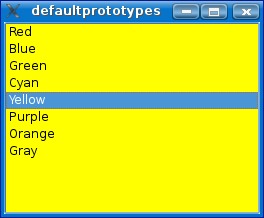Default Prototypes Example
Files:
This Qt Script example shows how to use default prototypes to make a non-QObject-based type scriptable.

With QScriptEngine::setDefaultPrototype() you can specify a QtScript object that defines a scripting interface for a C++ type; Qt Script operations on values of such types will then be delegated to your prototype object. In this example, a simple scripting interface for QListWidgetItem is defined, so that the text of items can easily be accessed from script code.
To define a scripting API for QListWidgetItem in terms of Qt properties and slots, we subclass QObject and QScriptable.
class ListWidgetItemPrototype : public QObject, public QScriptable
{
Q_OBJECT
Q_PROPERTY(QString text READ text WRITE setText)
public:
ListWidgetItemPrototype(QObject *parent = 0);
QString text() const;
void setText(const QString &text);
public slots:
QString toString() const;
};
A single property, text, is defined, along with a slot, toString.
ListWidgetItemPrototype::ListWidgetItemPrototype(QObject *parent)
: QObject(parent)
{
}
QString ListWidgetItemPrototype::text() const
{
QListWidgetItem *item = qscriptvalue_cast<QListWidgetItem*>(thisObject());
if (item)
return item->text();
return QString();
}
void ListWidgetItemPrototype::setText(const QString &text)
{
QListWidgetItem *item = qscriptvalue_cast<QListWidgetItem*>(thisObject());
if (item)
item->setText(text);
}
QString ListWidgetItemPrototype::toString() const
{
return QString("ListWidgetItem(text = %0)").arg(text());
}
The implementation of the property accessors use the qscriptvalue_cast() function to cast the script object to a QListWidgetItem pointer. The normal C++ QListWidgetItem API is then used to implement the desired functionality.
Although not shown here, it is possible to throw a script exception from a prototype function; for example, you could throw a TypeError exception if the qscriptvalue_cast() fails.
QListWidgetItems are usually added to a QListWidget. While QListWidget is a QObject-based class, not all the functionality needed for this example are present. We can solve this by creating a default prototype for the QListWidget class as well. The prototype will augment the functionality already provided by the Qt Script QObject integration; i.e. if a property or slot is not found in the QListWidget object itself, the prototype will be used as a fallback.
class ListWidgetPrototype : public QObject, public QScriptable
{
Q_OBJECT
public:
ListWidgetPrototype(QObject *parent = 0);
public slots:
void addItem(const QString &text);
void addItems(const QStringList &texts);
void setBackgroundColor(const QString &colorName);
};
The additional slots will make it possible to add items to a QListWidget from script code, and to set the background color of the widget from a string.
ListWidgetPrototype::ListWidgetPrototype(QObject *parent)
: QObject(parent)
{
}
void ListWidgetPrototype::addItem(const QString &text)
{
QListWidget *widget = qscriptvalue_cast<QListWidget*>(thisObject());
if (widget)
widget->addItem(text);
}
void ListWidgetPrototype::addItems(const QStringList &texts)
{
QListWidget *widget = qscriptvalue_cast<QListWidget*>(thisObject());
if (widget)
widget->addItems(texts);
}
void ListWidgetPrototype::setBackgroundColor(const QString &colorName)
{
QListWidget *widget = qscriptvalue_cast<QListWidget*>(thisObject());
if (widget) {
QPalette palette = widget->palette();
QColor color(colorName);
palette.setBrush(QPalette::Base, color);
widget->setPalette(palette);
}
}
Again, we use qscriptvalue_cast() to cast the script object to the relevant C++ type, in this case a QListWidget pointer. The addItem() and addItems() functions simply forward their arguments to the corresponding functions in the QListWidget class. setBackgroundColor() gets the widget's palette, creates a QColor from the given string argument and changes the palette accordingly.
Q_DECLARE_METATYPE(QListWidgetItem*)
Q_DECLARE_METATYPE(QListWidget*)
The relevant C++ types must be made known to Qt's meta type system.
QScriptEngine engine;
ListWidgetItemPrototype lwiProto;
engine.setDefaultPrototype(qMetaTypeId<QListWidgetItem*>(),
engine.newQObject(&lwiProto));
ListWidgetPrototype lwProto;
engine.setDefaultPrototype(qMetaTypeId<QListWidget*>(),
engine.newQObject(&lwProto));
For each type that we want to associate a prototype object with, we create an instance of the prototype class, pass it to QScriptEngine::newQObject(), and then create the link between the C++ type and the resulting script object by calling QScriptEngine::setDefaultPrototype().
QListWidget listWidget;
engine.globalObject().setProperty("listWidget",
engine.newQObject(&listWidget));
In this example, a single QListWidget object is added as a global script variable, called listWidget. Script code can add items to this widget by calling addItem() or addItems().
listWidget.addItem("Red");
listWidget.addItem("Blue");
listWidget.addItem("Green");
listWidget.addItem("Cyan");
listWidget.addItem("Yellow");
listWidget.addItem("Purple");
listWidget.addItems(["Orange", "Gray"]);
Script code can connect to signals of the QListWidget object; signal handlers can use the interface defined in the QListWidgetItem prototype to manipulate item arguments.
listWidget.currentItemChanged.connect(
function(item)
{
listWidget.setBackgroundColor(item.text);
}
);
Not shown in this example is how to make QListWidgetItem constructible from Qt Script code, i.e. to be able to write "new QListWidgetItem()" in a script. In order to do this, you have to define your own script constructor for the type. The constructor would just be a factory function that constructs a new C++ QListWidgetItem and returns it back to the script. See QScriptEngine::newFunction() for more information.























